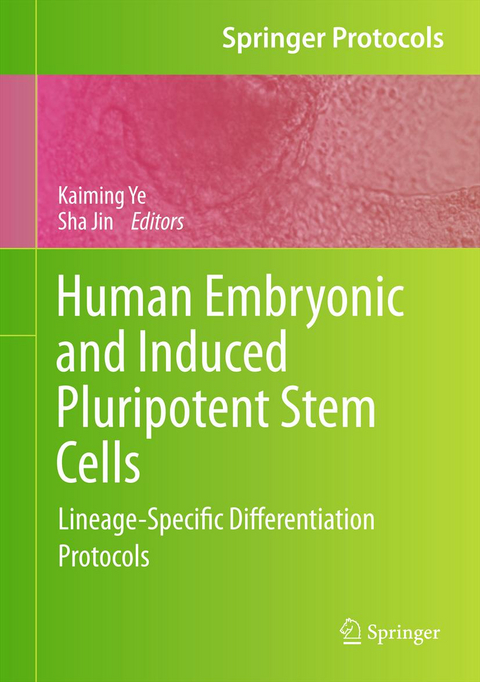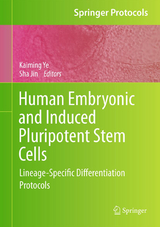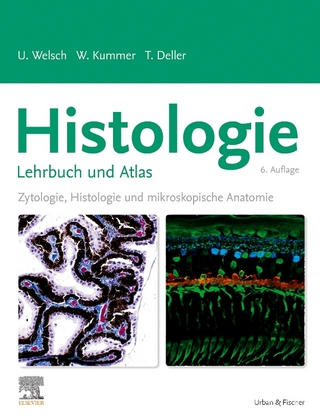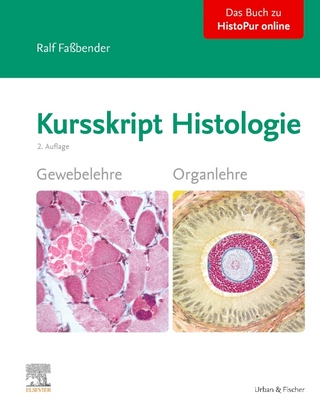Human Embryonic and Induced Pluripotent Stem Cells
Humana Press Inc. (Verlag)
978-1-61779-266-3 (ISBN)
Because of the huge potential of human embryonic stem (hES) cells, especially the newly developed human induced pluripotent stem (hiPS) cells, in disease treatment and life quality improvement, enormous efforts have been made to develop new methodologies to translate lab discoveries in stem cell research into bed-side clinical technologies. In Human Embryonic and Induced Pluripotent Stem Cells: Lineage-Specific Differentiation Protocols, experts in the field present a comprehensive collection of protocols designed for labs around the world. The topics covered in this detailed volume include techniques used for maintenance of hES and iPS cells in either small or large scale, techniques for directing hES and iPS cell lineage specification, techniques for enhancing the maturity of differentiated hES and iPS cells within three-dimensional scaffolds, techniques for reprogramming adult cells into iPS cells, techniques for generating patient-specific iPS cells, and techniques for translating hES and iPS cell research into new therapies. Chapters include lab ready protocols with tips on troubleshooting and avoiding known pitfalls.
Wide-ranging and authoritative, Human Embryonic and Induced Pluripotent Stem Cells: Lineage-Specific Differentiation Protocols will be a tremendous aid for researchers and students who wish to explore these areas and transform their discoveries into the next generation of regenerative medicine and tissue engineering technologies.
Feeder-Free Growth of Undifferentiated Human Embryonic Stem Cells.- Growth of Human Embryonic Stem Cells in Long-Term Hypoxia.- Laboratory–Scale Purification of a Recombinant E-Cadherin-IgG Fc Fusion Protein that Provides a Cell Surface Matrix for Extended Culture and Efficient Subculture of Human Pluripotent Stem Cells.- Scale-Up of Single Cell-Inoculated Suspension Cultures of Human Embryonic Stem Cells.- Three-Dimensional Culture for Expansion and Differentiation of Embryonic Stem Cells.- Expansion of Pluripotent Stem Cells in Defined Xeno-Free Culture System.- Pluripotent Stem Cells In Vitro from Human Primordial Germ Cells.- Cryopreservation of Human Embryonic Stem Cells and Induced Pluripotent Stem Cells.- Induced Pluripotent Stem Cells (iPSC) from Cord Blood CD133+ Cells Using Oct4 and Sox2.- Generation, Maintenance, and Differentiation of Human iPS Cells from Cord Blood.- Generation of iPS Cells from Human Umbilical Vein Endothelial Cells by Lentiviral Transduction and Their Differentiation to Neuronal Lineage.- Generation of Human Induced Pluripotent Stem Cells from Endoderm Origin Cells.- Derivation of Human Induced Pluripotent Stem Cells on Autologous Feeders.- Human Mesenchymal Stem Cells and iPS Cells (Preparation Methods).- Retroviral Vector-Based Approaches for the Generation of Human Induced Pluripotent Stem Cells from Fibroblasts and Keratinocytes.- Generation of Nonviral Integration-Free Induced Pluripotent Stem Cells from Plucked Human Hair Follicles.- Generation of iPS Cells from Human Skin Biopsy.- Generation of Induced Pluripotent Stem Cells from Human Amnion Cells.- In Vitro Two-Dimensional Endothelial Differentiation of Human Embryonic Stem Cells.- Feeder-Free Culture for High Efficiency Production of Subculturable Vascular Endothelial Cells from Human Embryonic Stem Cells.- Feeder-Independent Maintenance of Human Embryonic Stem Cells and DirectedDifferentiation into Endothelial Cells under Hypoxic Condition.- Differentiation of Endothelial Cells from Human Embryonic Stem Cells and Induced Pluripotent Stem Cells.- Differentiation of Human Embryonic and Induced Pluripotent Stem Cells into Blood Cells in Coculture with Murine Stromal Cells.- Generation of Multipotent CD34+CD45+ Hematopoietic Progenitors from Human Induced Pluripotent Stem Cells.- Adipogenic Differentiation of Human Induced Pluripotent Stem Cells.- Chondrogenic Differentiation of hESC in Micromass Culture.- Deriving Hepatic Endoderm from Pluripotent Stem Cells.- Multistage Hepatic Differentiation from Human Induced Pluripotent Stem Cells.- Hepatic Maturation of hES Cells by Using a Murine Mesenchymal Cell Line Derived from Fetal Livers.- Generation of Lung Epithelial-Like Tissue from hESC by Air-Liquid Interface Culture.- Direct Differentiation of Human Embryonic Stem Cells into Selective Neurons on Nanoscale Ridge/Groove Pattern Arrays.- Neural Differentiation of Human ES and iPS Cells in Three-Dimensional Collagen and MatrigelTM Gels.- Single-Cell Transcript Profiling of Differentiating Embryonic Stem Cells.- Using Endogenous MicroRNA Expression Patterns to Visualize Neural Differentiation of Human Pluripotent Stem Cells.
| Reihe/Serie | Springer Protocols Handbooks |
|---|---|
| Zusatzinfo | 48 Illustrations, color; 40 Illustrations, black and white; XVI, 486 p. 88 illus., 48 illus. in color. |
| Verlagsort | Totowa, NJ |
| Sprache | englisch |
| Maße | 178 x 254 mm |
| Themenwelt | Studium ► 1. Studienabschnitt (Vorklinik) ► Histologie / Embryologie |
| Naturwissenschaften ► Biologie ► Genetik / Molekularbiologie | |
| Naturwissenschaften ► Biologie ► Mikrobiologie / Immunologie | |
| Naturwissenschaften ► Biologie ► Zellbiologie | |
| ISBN-10 | 1-61779-266-7 / 1617792667 |
| ISBN-13 | 978-1-61779-266-3 / 9781617792663 |
| Zustand | Neuware |
| Haben Sie eine Frage zum Produkt? |
aus dem Bereich




